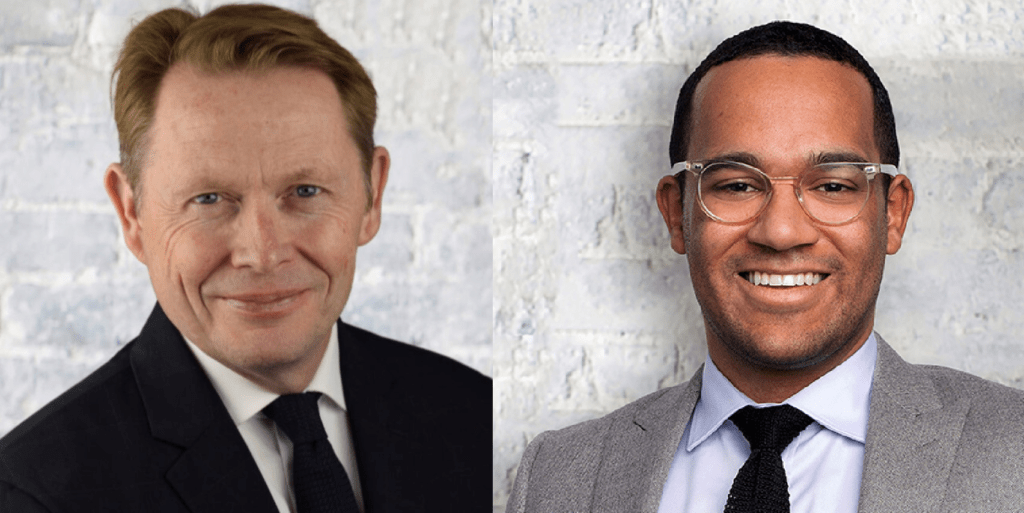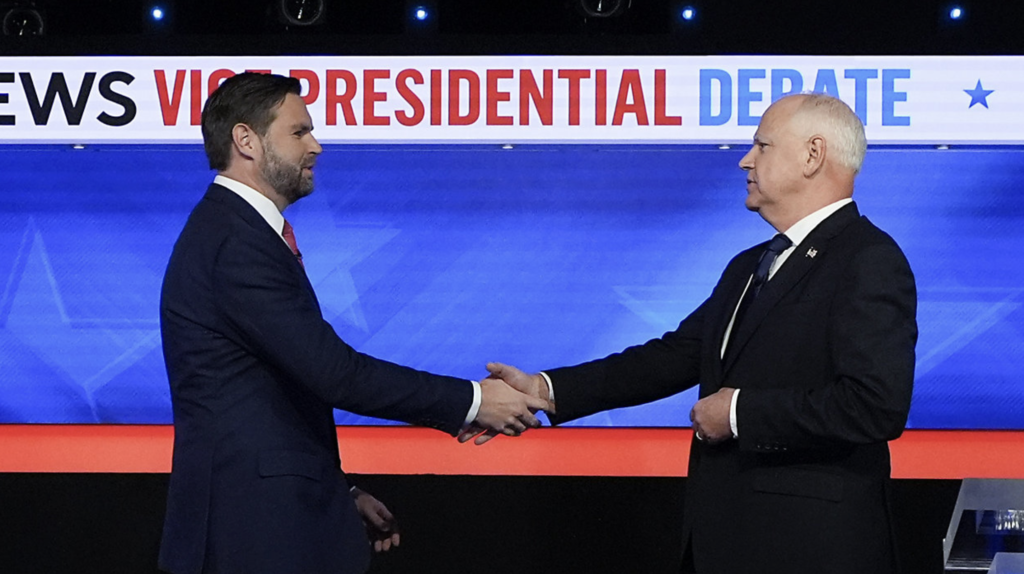Policy Conversation: The VP Debate, Breaking Through the Noise, and It’s All About GOTV
 Counsel PA
Counsel PA
Welcome to the latest in our series of Policy Conversations between Counsel Public Affairs Senior VP John Delacourtand Counsel PA Account Director Will Shelling about the 2024 US presidential election. John is a veteran Liberal strategist, longtime Policy contributor and novelist, and Will is a Vegas-raised, Vancouver-based NDPer. This is their fifth exchange in the series.
By John Delacourt and Will Shelling
October 4, 2024
Will Shelling: John, I think we agree this debate wasn’t the big splash that the Harris-Walz campaign wanted. JD Vance reigned supreme as the most convincing liar on the stage, with a litany of false statements and exaggerations on issues ranging from the right to choose to gun violence to childcare. His hot mic pointedly caught his aggravation when the moderators began fact checking.
John Delacourt: Will, I’m in complete agreement about this debate falling short for the Harris-Walz campaign. Both vice-presidential candidates seemed to – mostly – embrace a state of entente which was puzzling, at the very least, to me. We already know Walz can emanate homespun, “nice dad” vibes. What did his collegial tone with Vance do to bring Harris closer to victory? Aside from the strong exchange on the January 6th insurrection, he seemed to shy away from speaking about the palpable threat to democratic institutions and the drift to dangerous authoritarianism the prospect of Trump 2.0 all but confirms.
Shelling: In a way, it was a misguided reversal for Walz to go back to the respectability politics that have been the scourge of the Democratic Party until this point. Walz seemed to forget he was speaking with a very competent liar who was firmly rooted in his beliefs. Even if he said something false, it sounded “true”, if that makes sense.
Delacourt: Too much sense, sadly. In her debate with Trump, Harris never lost an opportunity to underscore this point. I’m puzzled as to why Team Harris-Walz figured, “Hey, we can probably hug this out with Republican-leaning voters from here on in.” The advantage to keeping the focus on Trump would have been twofold: it would have blunted the effect of seeing an ostensibly sensible, Harvard-educated, articulate candidate implicitly send a message that the next four years of Trump were going to be fine, just fine – “Hey, if a tech bro like me’s on board, what’s the risk, really?”
You mentioned you’ve been speaking to American friends who’ve been following this closely. I’m watching the polls tighten up in swing states and feeling like it might be time for the Democrats to pull some kind of fire alarm, but Walz’s performance and approach might seem to suggest otherwise. Do you think I’m being too alarmist?
Shelling: I don’t think it’s alarmist at all, but this is far from an October surprise. While I was busy working a campaign up here, I was fervently in the group chats with several friends getting their takes, and for the majority of them, they said it didn’t change their opinion much, and who you thought won pretty much was split down party lines. This is reflected in the larger narrative; it was a polite, if not muted debate, that hearkened back to a time where it was expected that candidates simply debate policy, rather than interrogating ideological differences through dog whistles.
I think this shouldn’t be a fire alarm level moment, but instead a pivot and an affirmation of the previous strategy. Walz is better communicating policy to undecideds and those in swing states, far away from the glitz of a stage. Harris is a born communicator and is better at larger events where she can be the main draw. I think the Democrats also have a firm focus on down-ballot spending and support, which may not crystallize fully until Election Day, but it is vital to maintaining support of the party locally. I think we do tend to forget that politics is rooted in communities, especially since we do love the spectacle of national events.
Some data from Brookings suggest that vice-presidential debates just blend into the overall narrative of the larger race, and enter into the cacophony of noise that voters are dealing with right now. VP debates usually have lower ratings, but are a way that candidates, especially newcomers like these two, can introduce themselves to a wider audience. Setting aside the lies, do you think VP debates really sway voters?
 AP
AP
Delacourt: I think, if previous campaigns are any guide, that the merits of these debates are that they can confirm bench strength, show that both urban and rural voters can find a comfortable home in a party, if only for an election cycle. It’s more defense than offence. No one remembers Tim Kaine’s performance – Hillary Clinton’s running mate – and I’d argue it was because Kaine didn’t resonate with rust belt voters, who proved to be a decisive constituency for Trump. However, it’s instructive to remember a younger Joe Biden’s performance against another smooth Republican performer, Paul Ryan. It was sharp and effective, affirming the game Biden brought to the campaign as the “scrapper from Scranton.” Comparatively, Walz was the maundering Minnesotan.
And I’m not sure if precedents can be a guide. I think this now poses a risk that could have been mitigated – and just might prove significant.
Shelling: Totally, and I think that VP debates, if anything, are often under-watched compared to the presidential debate. CBS finally released their ratings, showing that this debate wasn’t nearly as watched as the 2020 VP debate, it’s still up from 2016. Additionally, social media’s pull is weighing heavily on this race. Even with a Musk-controlled “X”, we’re seeing positive spin placed on somewhat lacklustre performances from both men.
The next couple of weeks are going to be crucial for the two campaigns. Based on Vance’s performance, Trump might want to loosen his leash and let him speak. Based on Walz’s performance, Harris might want him to remain focused on battleground states and meeting undecided voters there. Something I want to draw attention to in Walz’ debate is that while he was incredibly knowledgeable about the issues, he found his footing a bit late, likely by a time when key voters would have turned off the stream. It seems based on early reporting that students in key battleground ridings have unchanged opinions on the candidates, despite what social media would be telling us.
Delacourt: Yeah, and unchanged can also mean uninspired. My understanding is that one of the biggest threats for Harris-Walz is that young people will stay home rather than be motivated to make that plan to get to the polls. Even if they’re receptive to the Democrats’ policy planks on key issues for young people, they need to feel it’s crucial that they show up. From your conversations, do you think the risks of a disaffected or unmotivated younger cohort might be real?
Shelling: The choices of voting “undecided” or simply not voting are very real right now because many younger voters (and including many of my friends) feel that there is simply no “good” choice in the political system. Especially in two party systems like the United States, young folks are generally feeling disaffected and as if the political elite has abandoned good governance ages ago, especially on the issue of the climate crisis. Every incumbent leader right now is facing the same disaffected youth voters that would normally head to the polls in droves. While Harris might be leading Trump with younger voters, I’m concerned that any possible turn off (e.g. changes in climate policy, public safety, or foreign affairs ) will result in these voters not heading to the polls, Let’s put a pin in this one for later, there’s so much more to say!
Unless Harris decides to debate an empty podium this October, this election is going down to the doorstep and every event in swing states. Frankly, I think Walz might be better served doing what he does best, meeting people, rather than being on television. It’s clear the Democratic path to victory is to have an awe-inspiring GOTV effort, but we won’t see anything of this nature until late October. What do you think is next for both campaigns from here?
Delacourt: I think you’ve nailed it, Will. It’s all about GOTV. I’m not sure if advance – or “early in person” – polling is as much a strategic consideration, but I feel it could be crucial. The work on the ground of organizers like Stacey Abrams was crucial in 2020. It seems like you’ll need a small army of women – and young people – like her to pull this off once again now.
John Delacourt is a Senior VP at Counsel Public Affairs. He has served in a number of portfolios in three federal Liberal governments, as well as in communications and stakeholder relations in Opposition. He is the author of five novels and a regular contributor to Policy magazine.
Will Shelling is an account director at Counsel PA and New Democrat who specializes in justice, equity, diversity and inclusion, Indigenous affairs, climate change, and Canadian culture. He is a director for White Ribbon Canada, a national non-profit dedicated to ending gender-based violence. He was raised in Las Vegas, and now lives in Vancouver, BC.
John and Will will be conversing weekly until November.
